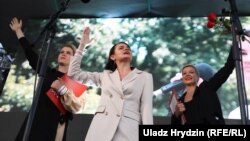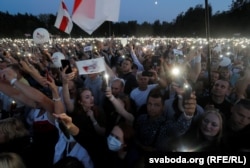Appearing before a Minsk campaign rally of thousands on the evening of July 30, Belarusian presidential candidate Svyatlana Tsikhanouskaya denounced the government’s allegations that her husband, jailed vlogger Syarhey Tsikhanouski, had collaborated with 33 alleged Russian mercenaries to foster unrest and undermine Belarus’ upcoming presidential elections.
“My husband, Syarhey Tsikhanouski, is not a criminal,” Tsikhanouskaya told her cheering, flag-waving supporters in the Belarusian capital’s Peoples’ Friendship park.
“I could only imagine in a nightmare to whom they can tie these fighters,” she said. “They talk about some kind of revolution. My God, what revolution? People, we just want peaceful changes.”
The 37-year-old homemaker-turned-candidate is currently the August 9 ballot’s most prominent opponent to President Alyaksandr Lukashenka, who has ruled Belarus for 26 years. She entered the campaign for the August 9 presidential vote after election officials refused to register her husband, a well-known and outspoken Lukashenka critic, for the race.
Tsikhanouski is currently in jail for allegedly disobeying police officers and causing a public disturbance -- charges he rejects as politically motivated. On July 30, the government added more severe criminal charges to this count after alleging that the YouTube vlogger was plotting “massive unrest” in Belarus along with 33 detained Russian men, who have been identified as employees of the Vagner Group, a private Russian military company, and charged with preparing an act of terrorism during Belarus’ election campaign.
The Russian Foreign Ministry on July 30 denounced the allegations against the men as “odious” and “unable to withstand criticism.” It stated that a Belarusian company had organized the men’s flight layover in Minsk en route to Istanbul from Russia. It called on Minsk to stop encouraging “unnecessary -- especially during a presidential election period -- negative emotions.”
After media reported about the men’s July 29 detention, Tsikhanouskaya said that her campaign had expected the declaration of a state of emergency that would cancel the August 9 elections or “a provocation” that would lead to election officials striking her name from the list of presidential candidates.
“But the trouble came from where we didn’t expect, although it wasn’t unexpected: They tied this group to Tsikhanouski.”
In response, Tsikhanouskaya appealed to law enforcement and members of the armed services to realize that “We are the same as you.”
“Belarusians who support alternative candidates [to President Lukashenka] are not criminals,” she emphasized. “These are our people -- a people who want a peaceful change of government.”
Tsikhanouskaya has pledged fresh presidential elections within six months of becoming Belarus’ president.
Some observers believe the accusations against Tsikhanouskaya’s husband were intended to decrease voter support for the political novice and the chances for such a repeat vote. She currently is collaborating with the campaigns of two former would-be presidential candidates who were also deemed potential serious rivals to Lukashenka: jailed banker Viktar Babaryka and entrepreneur Valer Tsapkala, who recently fled to Russia, fearing arrest.
Judging by the turnout at the Peoples’ Friendship park rally, however, the government’s accusations did not overly alarm Tsikhanouskaya’s supporters.
An event volunteer from the Vyasna human-rights center initially estimated the number of participants at 25,000 and, then, at 65,000. A police estimate was not immediately available.
Long lines of individuals waiting to go through bag-checks and pat-downs by police stretched through the park at entrances to the event. Afterwards, drivers of nearby cars appeared to honk their support for the rally.
But while signs of voter support for this Lukashenka rival voter are “unprecedented,” commented political analyst Valer Karbalevich, high turnout at Tsikhanouskaya’s officially authorized rallies does not guarantee similar turnout at unauthorized protests should she lose the election, he cautioned.
Though anecdotal evidence suggests that support for Lukashenka has shrunk considerably since his last re-election in 2015, how much the “anyone but Lukashenka” vote will work against the Belarusian leader is unclear, he added. Non-government-run polls of voters are not allowed in Belarus.
The political elite has recovered from the initial "shock" of Tsikhanouskaya’s sudden surge to popularity, commented Yuri Tsarik, co-founder of Minsk’s non-governmental Center for Strategic and Foreign Policy Studies, and are now falling back on traditional tools for silencing government critics.
Speaking from Kyiv, analyst Maksym Khylko from the East European Security Research Initiative, also advised caution in evaluating the chances for any change of government in Belarus.
The Tsikhanouskaya campaign needs more than a general call for fair presidential elections, Khylko commented. “Lukashenka is at the top of this system that he built over 26 years in power and quickly changing this system will not be that simple,” he said.
As in Russia, he noted, voter rallies or demonstrations “can end in nothing.”
-With additional reporting from RFE/RL's Belarusian Service
Editor's Note: This article earlier stated that Svyatlana Tsikhanouskaya is 38 years old. She was 37 years old at the time of publication.






